- Home
- James Rollins
The Devil Colony Page 6
The Devil Colony Read online
Page 6
“Why?”
“Because I figured it’s damn easy to hide a cell phone.”
He glanced quizzically at her.
She explained. “From the number of people who witnessed the attack, the odds were good that someone got a picture or video of the bomber. So why no footage?”
“Maybe everyone was too panicked.”
“Perhaps after the bomb, but not before. If you start with the proposition that a photo was taken, why wasn’t it turned in to the police? I followed that line of reasoning. Greed is a strong motivator.”
“You think someone hid footage of the bomber to make a few bucks.”
“To be thorough, I had to assume that. It would be easy enough to hide a phone during the chaos. Or even e-mail the footage and erase the record. So I canvassed the broadcast logs for tonight’s local news in Salt Lake City and came across a file at an NBC affiliate labeled ‘New Footage from the Utah Bombing.’ ”
Kat hit a button on the keyboard, and a video started playing, another view of the same scenario he’d watched over and over. Only this time, the bomber was caught in full view, exiting the cave, still carrying the backpack. She was moving fast, but for a fraction of a second, she stared fully at the camera.
Kat deftly captured the image and froze it. The image was grainy, but she certainly looked Native American, as the eyewitnesses had reported.
Painter leaned closer. His heart began pounding harder. “Can you zoom in?”
“The resolution’s poor. I’ll need a minute to clean it up.” Kat’s fingers flew over the keyboard. “I thought we should be ahead of the curve on this. The broadcast is slated for the top of the six o’clock hour in Salt Lake City. I happened to read a draft of the accompanying copy. It’s very inflammatory. Coloring the attack as a possible resurgence of Native American militancy. In the same broadcast folder, they posted archival footage of Wounded Knee.”
Painter bit back a groan. Back in 1973, members of the American Indian movement waged a bloody siege with the FBI in Wounded Knee, South Dakota. Two people were killed and many others injured in the firefight that ensued. It took decades for the tension between the tribes and the government to subside.
“Okay,” Kat said. “Program’s done rendering the sample.”
The image reappeared, a thousand times crisper. Kat manipulated the computer mouse to fill the screen with the girl’s face. The detail was amazing. Her dark eyes were wide with fear, her lips parted in a panicked breath, her ebony hair billowing out and framing distinctly Native American features.
“She’s certainly a looker,” Kat said. “Somebody must know her. It won’t take long to put a name to that pretty face.”
Painter barely heard the words. He stared at the screen. His vision narrowed, fixed upon that frozen image.
Kat must have sensed something wrong and turned to face him. “Director Crowe?”
Before he could respond, his cell phone rang. He pulled it out. It was his personal BlackBerry, unencrypted.
Must be Lisa checking about the barbecue party.
He put the phone to his ear, needing to hear her voice.
But it wasn’t Lisa. The caller’s words came rushed, breathless. “Uncle Crowe . . . I need your help.”
Shock choked him.
“I’m in trouble. So much trouble. I don’t know—”
The words suddenly died. In the background, he heard the growl of a large animal, followed by a sharp, terrified scream.
Painter gripped the phone harder. “Kai!”
The line cut off.
Chapter 4
May 30, 2:50 P.M.
Utah Wilderness
Kai backed away from the dog.
Covered in mud, soaked to the skin, it looked feral, maybe even rabid. Lips rippled back in a menacing growl, baring all its teeth. It stalked toward her, head low, tail high, ready to pounce at her throat.
A shout behind her made her jump. “That’s enough, Kawtch! Back down!”
She turned as a tall man in a Stetson rode through a thick stand of lodgepole pines atop a chestnut quarter horse. The mare moved with an easy grace, stepping nearly silently up the slope.
Kai pressed her back against a tree, ready to flee. She was sure it was a federal marshal, swore she even spotted a badge, but once he got closer, she saw it was only a compass hanging around his neck. He tucked it back under his shirt.
“You gave us quite the chase, young lady,” the man said harshly, his face still shadowed by his wide-brimmed hat. “But there’s no trail Kawtch can’t follow once he’s got his nose to it.”
The dog wagged its tail, but its sharp eyes remained locked on her. A low growl rumbled.
The stranger slid out of his saddle and dropped easily to the ground. He patted the dog to calm it as he joined her. “You’ll have to excuse Kawtch. He’s still spooked by that explosion. Got him all on edge.”
Kai didn’t know what to make of the man’s attitude. He was plainly not with the National Guard or the state police. Was he a bounty hunter? She eyed the pistol holstered on his right hip. Was that meant for her or merely a wise precaution against the black bears and bobcats that roamed the forests up here?
The stranger finally stepped out of the shadows, took off his Stetson, and wiped his brow with a handkerchief. She recognized his salt-and-pepper hair tied in a ponytail, the unmistakable hard planes of his Native American features. Shock made her momentarily dizzy. She had seen this same man in the mountain cavern only a couple of hours ago.
“Professor Kanosh . . .” His name tumbled from her lips, her voice half angry, half relieved.
One eyebrow cocked in surprise. It took him a moment to speak. He held out his hand. “I suppose, under the circumstances, Hank will do.”
She refused to take his hand. She still remembered John Hawkes’s description of the man. An Indian Uncle Tom. Of course, this traitor to his people would be working for the government to help track her down.
His arm dropped. He planted his hands on his hips, fingers brushing the top of his holstered pistol. “So what’re we going to do with you, young lady? You’ve got yourself into a mountain of trouble. All the law on this side of the Rockies is out looking for you. That explosion back there—”
She had heard enough. “It wasn’t my fault!” she blurted out, loud and angry, needing to lash out against someone. “I don’t know what happened!”
“That may be so, but someone died during that blast. A dear friend of mine. And people are looking for someone to blame.”
She stared at him. She read the well of sadness in the deep wrinkles at the corner of his eyes. He was telling the truth.
With his words, the anger inside her blew out like a doused candle. Her worst fears were now real. She covered her face, remembering the blast, the blinding flash. She slumped down the trunk of the tree and crouched into a ball. She had murdered someone.
The well of tears that had been building inside her chest since the explosion broke through the tight terror. Silent sobs rocked through her.
“No one was supposed to get hurt,” she choked out, but her words sounded meaningless even to her.
A shadow fell over her. The old man knelt down, put an arm around her shoulders, and pulled her into his side. She didn’t have the strength to fight it.
“I can only imagine what you intended with that backpack full of explosives,” he said softly. “But you were right before. That explosion wasn’t your fault.”
She resisted the comfort of his words. Before her father died, he taught her right from wrong, instilled in her the importance of responsibility. It had just been the two of them most of her life. He took two jobs to keep food on the table and a roof over their heads. She spent more nights babysitting neighbors’ kids than in their own apartment. They took care of each other as well as they could.
So she could not fool herself. Whether it was by accident or not, her actions had ended up killing someone today.
“I don’t know what happened back there,�
�� Kanosh continued, his voice warm and full of reassurance, “but it wasn’t your explosives that blew up the mountainside. I think it was that totem skull. Or something inside that skull.”
A part of her heard his words and latched onto them like someone drowning. Still, lost in guilt and grief, she feared fully accepting what he was saying.
Perhaps sensing her resistance, he spoke quietly. “I read the reports before coming here, about the rumors concerning the cave, ancient stories shared by a handful of tribal elders. According to those stories, the burial cave was cursed, and any trespass would end in ruin for all.” He let out a soft and sad snort. “Maybe someone should have listened. As much as I’ve studied our people’s past, I’ve learned how often such stories have a hard kernel of truth inside of them.”
The strength of his arms and the assurance of his words helped calm her. Tears continued to flow, but she found the strength to lift her head, needing to see his face as much as hear his words.
“So . . . so the explosion wasn’t the C4 I had in my pack?”
“No. It was something much worse. It’s why I came looking for you. To protect you.”
She pulled straighter, out of his arms. He must have read her questioning look.
“That explosion helped set off the powder keg already brewing on the top of the mountain. When I slipped away, the activists gathered on the mountaintop were already beginning to skirmish with the National Guard. Everyone is accusing the other side of all manner of crimes and atrocities. But they’re all certain about one thing.”
She swallowed, guessing what that was. “They think I’m to blame.”
“And they’re all looking for you. And as much tension and confusion as is out there, I fear they may shoot first and ask questions later.”
She shivered, suddenly cold. “What am I going to do?”
“First, you’re going to tell me what happened. Everything. Every detail. The truth is often one’s best shield.”
She didn’t know where to begin, wasn’t sure she even knew the whole truth. But the old man’s hand found hers and squeezed reassurance. She took strength from the iron in those strong fingers, so much like her father’s callused hands.
Still, her words came reluctantly at first, but before long, her story came out in a rush, both as a confession and as an act of contrition. But deep down, she also knew she needed to unload her burden onto someone else’s shoulders and share it.
3:08 P.M.
Hank watched the girl as much as he listened to her accounting of events. He kept his questions to a minimum, discovering more truth in the telling than in the facts. He saw the raw fear dim to embers in her eyes. As she told her story, he recognized her deep-seated sense of betrayal after the death of her father, needing to blame someone, to make sense of a senseless murder. Lost and scared, she found a new home, a new tribe with her militant fellow members of WAHYA.
It was a story he’d heard all too often among Native American youth: broken families, poverty, domestic abuse, alcoholism. All of it compounded and concentrated by the isolation of reservation life. It left young men and women lost and angry, looking to lash out. Many fell into lives of crime, others into profound hatred for anyone in authority. It was men like John Hawkes, the founder of WAHYA, who preyed upon those lost souls, who twisted that teenage angst to serve their own ends.
It was a path Hank knew all too well. In his teen years, he had begun selling drugs, first in school, then more broadly. He settled in with a hard crowd. It was only after one of his best friends had been killed by a strung-out junkie that he found his way back to his faith, back to the Mormon Church of his tribe. To many, it was a strange path to salvation for an Indian. He knew the disdain other Native Americans had for those tribesmen who joined the Mormon faith. But since finding his way back home, he had never been more content.
And since then, he refused to give up on anyone lost who fell across his path. It was one of the reasons he fought so hard to protect tribal rights, not so much for the tribes themselves, but to support and enrich the reservations, to build a better foundation for the youngest among them.
His own grandfather—long in his grave—had once told him: The richest harvest comes from best-tilled soil. It was a philosophy he attempted to live by every day.
As the girl finished her story, she unzipped her jacket, drawing back his full attention. She pulled out two paperback-sized plates of metal.
“This is why I left without setting the charges. I took these. As proof for John Hawkes. To show him there was more gold than just that cat skull.”
Hank’s eyes grew wide. She had stolen two of the gold plates. He had thought they were all lost, buried under half a mountain.
“May I see those?”
She offered one to him, and he examined it under a patch of sunlight. Through the black grime, he could make out lines of strange script etched into the gold. This was the sole surviving clue to the mystery of that cavern, of the mass suicide, of what was hidden so that blood had to be spilled to protect it.
But in truth, his interest went beyond the academic. His hands trembled slightly as he held the plates. While he was Native American, he was also Mormon—and as a scholar of history, he had studied his religion’s past as thoroughly as his Native American heritage. According to his faith, the Book of Mormon came from translations of a lost language inscribed on gold plates discovered by Joseph Smith, the founder of the Church of Latter-Day Saints. Ever since that revelation, rumors of other caches of plates had been reported periodically across the Americas. Most of these discoveries were ruled out as hoaxes or frauds; others could never be found or substantiated.
He stared at the blurry writing, aching with both heart and head to study what was written there—but he had a more immediate concern.
The girl voiced it aloud. “What are we going to do?”
He passed the plate back to her and motioned for her to zip them both into her jacket again. He held out his arm once more, starting over. “Hank Kanosh.”
She took his hand this time. “Kai . . . Kai Quocheets.”
He frowned at her name. “If I’m not mistaken, Kai means ‘willow tree’ in Navajo. But from your accent and look, you strike me as someone from a Northeastern tribe.”
She nodded. “I’m Pequot Indian. My mother named me. She was a quarter Navajo, and according to my father, she wanted me to carry a bit of her heritage.”
Hank pointed down the mountainside. “Then let’s see how well you live up to your name, young lady. The willow is known for its resiliency in the face of strong winds. And a storm is certainly brewing around you.”
This earned him the shiest of grins.
Hank headed over to his horse. Though twenty years old, the mare was as sure-footed as any steed. He mounted up with a slight complaint from his hip.
He waved for Kawtch to lead the way. With the mountains being combed by armed hunters, he didn’t want any more surprises. Kawtch would alert him if anyone came too close.
Turning in the saddle, he offered an arm to Kai. She eyed the mare with suspicion. “You’ve never ridden before?” he asked.
“I grew up in Boston.”
“Okay then, grab my arm. I’ll pull you up behind me. Mariah won’t let you fall.”
The girl took hold of his wrist. “Where are we going?”
“To turn you in.”
Her smile vanished. The ember of fear flared brighter in her eyes. Before she could protest, he yanked her up, earning a sharp twinge from his shoulder.
“I’m sorry, but you’ll have to face what you did.”
She climbed into the saddle behind him. “But I didn’t cause the explosion.”
He twisted to face her. “True. But, aborted or not, you were still about to commit an act of violence. There will be consequences. But don’t worry. I’ll be at your side . . . along with a slew of Native American lawyers.”
His words failed to dim the fear shining in her eyes.
There
was nothing he could do about that. The sooner he got the child under custody, the safer she would be. As if it had heard his thought, the bell beat of a helicopter thundered out of nowhere. As he scanned the skies, a pair of scared arms circled his stomach. He never had a child himself, but the simple gesture warmed through him, igniting a paternal need to protect this frightened girl.
Off to the north, a small military chopper crested out of the neighboring valley and flew slowly over this one, dipping lower as it cleared the ridge, plainly searching. It looked like an angry and persistent hornet. Even without the military green of the craft, Hank recognized it as one of the Utah National Guard helicopters, even knew it was an Apache Longbow.
He took the name of the chopper as a good omen, not that either of them were Apache. He nudged his horse toward the edge of the pine forest, toward an open meadow.
Might as well get this over with.
Those arms tightened around him.
“Just stay low,” he told her. “Let me do all the talking.”
He kept Mariah to a slow walk, her flanks rolling as they headed toward the sunny spread of grass. He didn’t want anyone being surprised. Even before they reached the edge of the dense forest, the chopper banked abruptly and swung toward them.
Must have infrared aboard. Picked up our body heat.
He walked the mare out of the forest and into the open glade.
The helicopter dove toward them, nose dipping, blades cutting the air with a deafening chop. The noise was so loud, he could only stare as twin rows of grass and soil blasted upward, silently chewing across the meadow toward their position.
At last, he heard the rattle of the chopper’s chain guns.
What the hell . . . ?
Shock and disbelief froze him for a breath.
They were being fired at.
With a yank of the reins, he swung Mariah around.
A shout burst from his lips. “Hold tight!”
Chapter 5
May 30, 5:14 P.M.
Washington, D.C.

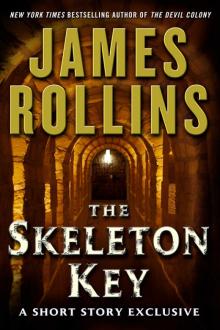 The Skeleton Key
The Skeleton Key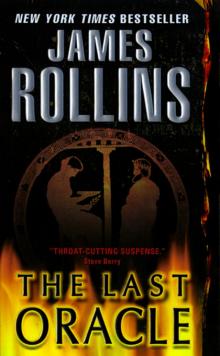 The Last Oracle
The Last Oracle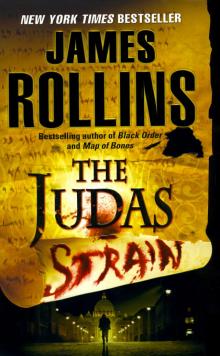 The Judas Strain
The Judas Strain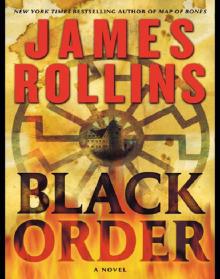 Black Order
Black Order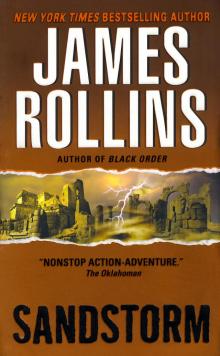 Sandstorm
Sandstorm Ghost Ship
Ghost Ship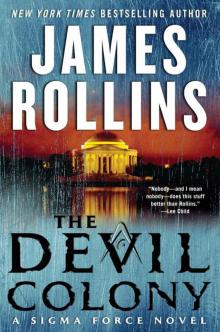 The Devil Colony
The Devil Colony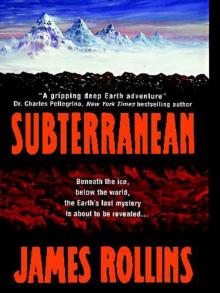 Subterranean
Subterranean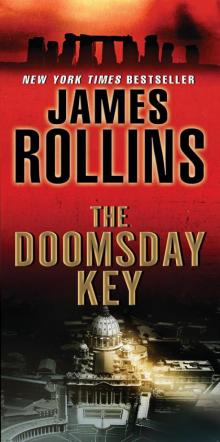 The Doomsday Key
The Doomsday Key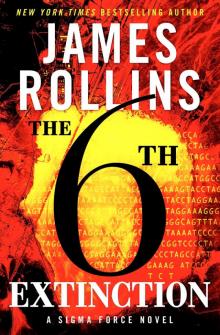 The 6th Extinction
The 6th Extinction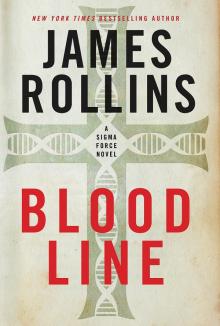 Bloodline
Bloodline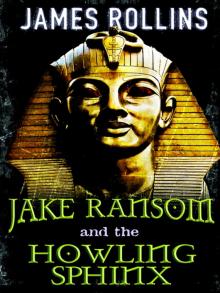 Jake Ransom and the Howling Sphinx
Jake Ransom and the Howling Sphinx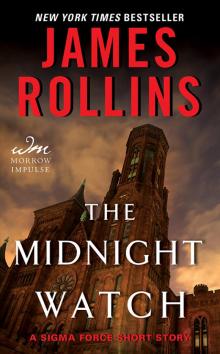 The Midnight Watch
The Midnight Watch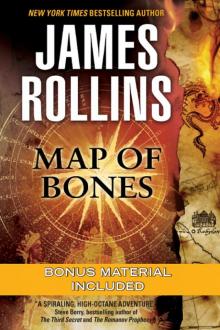 Map of Bones
Map of Bones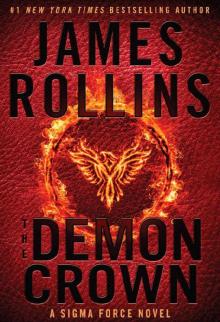 The Demon Crown
The Demon Crown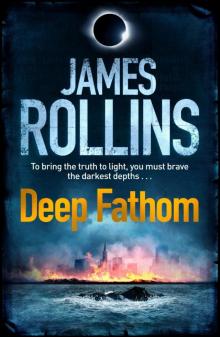 Deep Fathom
Deep Fathom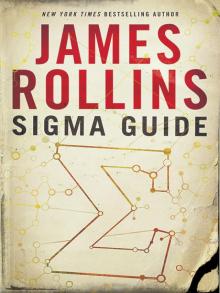 Sigma Guide
Sigma Guide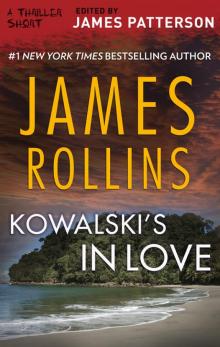 Kowalski's in Love
Kowalski's in Love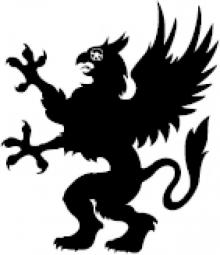 Jake Ransom and the Skull King's Shadow
Jake Ransom and the Skull King's Shadow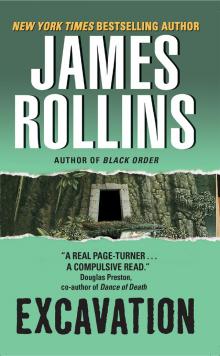 Excavation
Excavation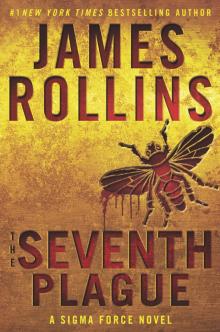 The Seventh Plague
The Seventh Plague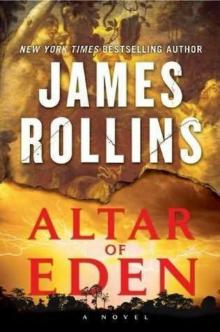 Altar of Eden
Altar of Eden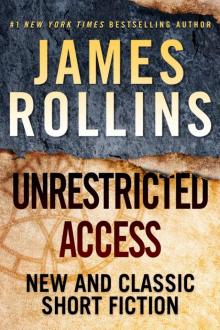 Unrestricted Access: New and Classic Short Fiction
Unrestricted Access: New and Classic Short Fiction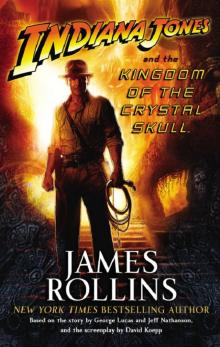 Indiana Jones and the Kingdom of the Crystal Skull
Indiana Jones and the Kingdom of the Crystal Skull Crucible
Crucible The Eye of God
The Eye of God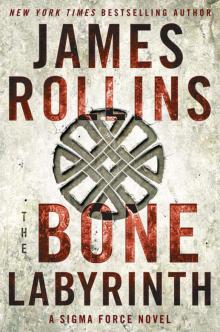 The Bone Labyrinth
The Bone Labyrinth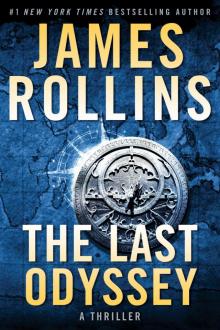 The Last Odyssey: A Thriller
The Last Odyssey: A Thriller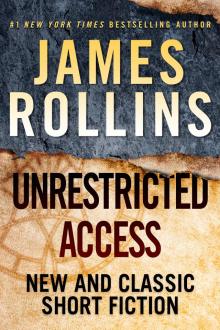 Unrestricted Access
Unrestricted Access Amazonia
Amazonia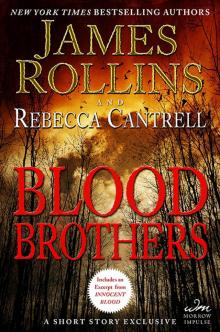 Blood Brothers: A Short Story Exclusive
Blood Brothers: A Short Story Exclusive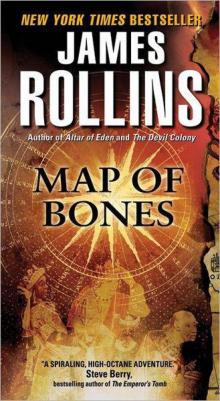 Map of Bones: A Sigma Force Novel
Map of Bones: A Sigma Force Novel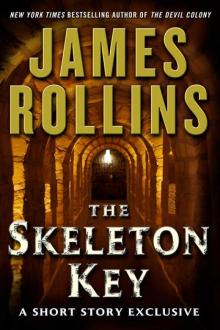 The Skeleton Key (sigma force)
The Skeleton Key (sigma force)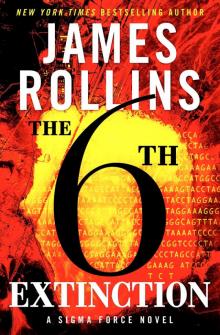 Sigma Force 10 - The Sixth Extinction
Sigma Force 10 - The Sixth Extinction Innocent Blood
Innocent Blood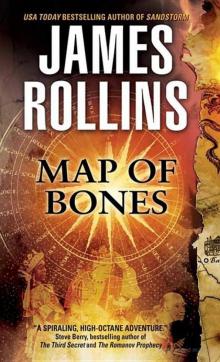 Map of Bones sf-2
Map of Bones sf-2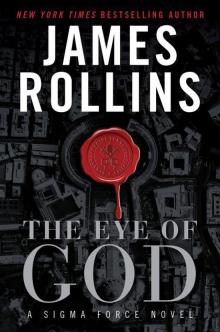 The Eye of God: A Sigma Force Novel
The Eye of God: A Sigma Force Novel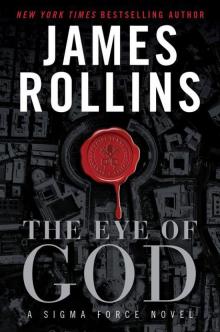 The Eye of God: A Sigma Force Novel sf-9
The Eye of God: A Sigma Force Novel sf-9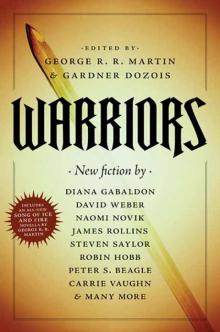 The Pit
The Pit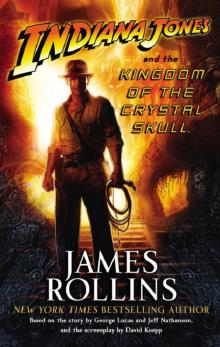 Indiana Jones and the The Kingdom Of The Crystal Skull
Indiana Jones and the The Kingdom Of The Crystal Skull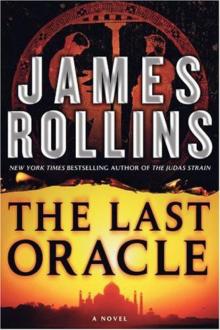 The Last Oracle (2008) sf-5
The Last Oracle (2008) sf-5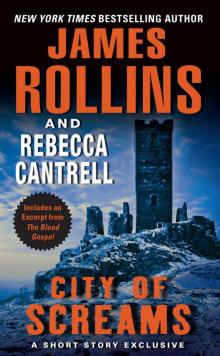 City of Screams
City of Screams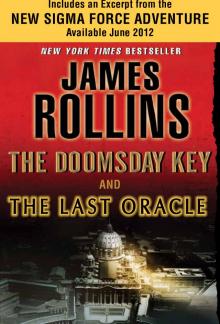 The Doomsday Key and The Last Oracle with Bonus Excerpts
The Doomsday Key and The Last Oracle with Bonus Excerpts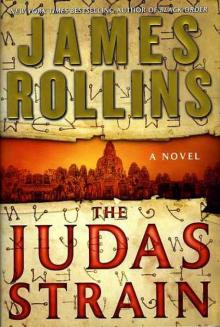 The Judas Strain sf-4
The Judas Strain sf-4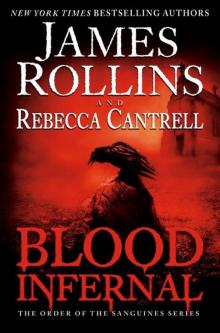 Blood Infernal
Blood Infernal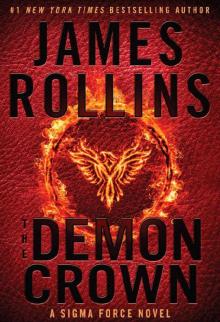 The Demon Crown: A Sigma Force Novel
The Demon Crown: A Sigma Force Novel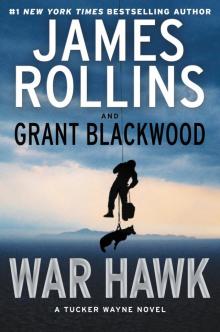 War Hawk: A Tucker Wayne Novel
War Hawk: A Tucker Wayne Novel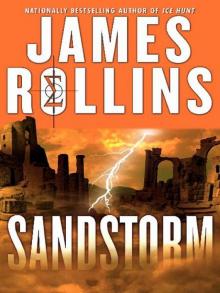 SANDSTORM sf-1
SANDSTORM sf-1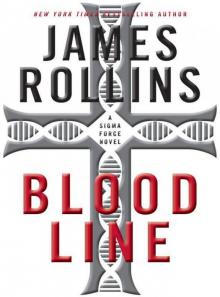 Bloodline: A Sigma Force Novel
Bloodline: A Sigma Force Novel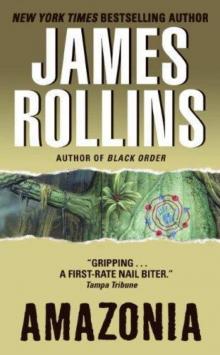 Amazonia: a novel
Amazonia: a novel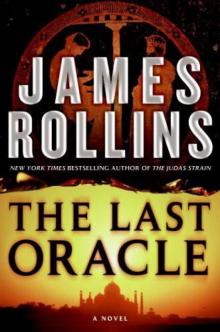 The Last Oracle: A Sigma Force Novel
The Last Oracle: A Sigma Force Novel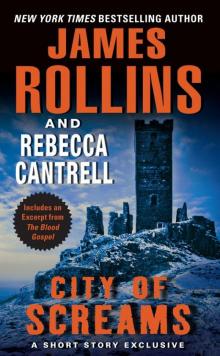 City of Screams (the order of the sanguines)
City of Screams (the order of the sanguines)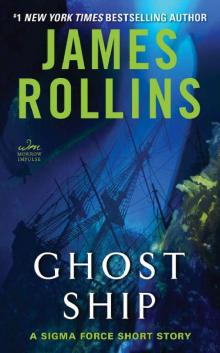 Ghost Ship: A Sigma Force Short Story
Ghost Ship: A Sigma Force Short Story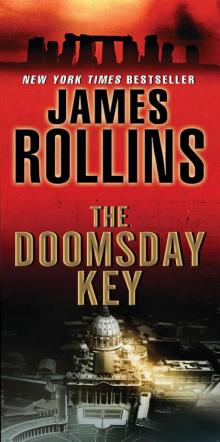 The Doomsday Key: A Sigma Force Novel
The Doomsday Key: A Sigma Force Novel